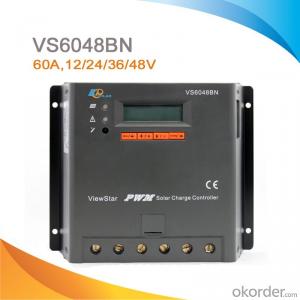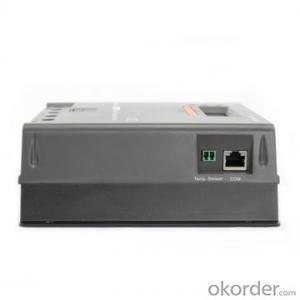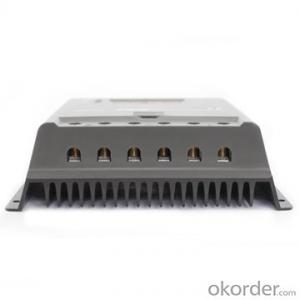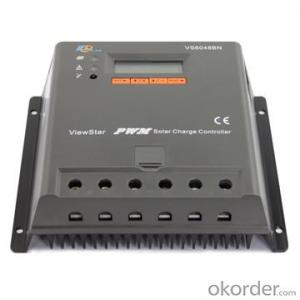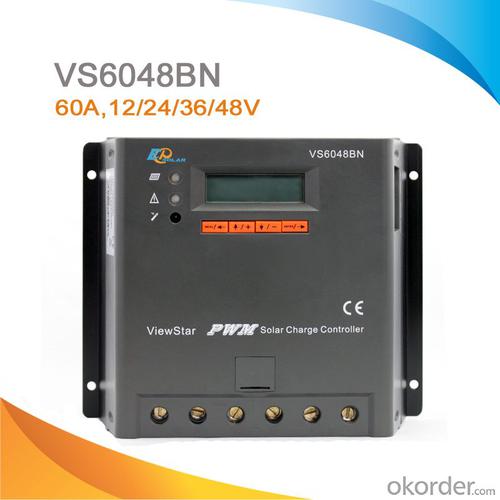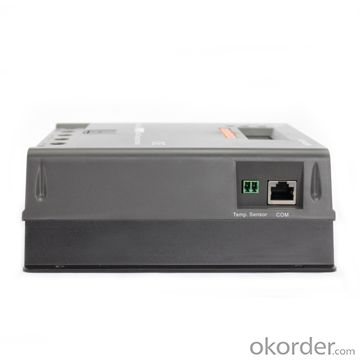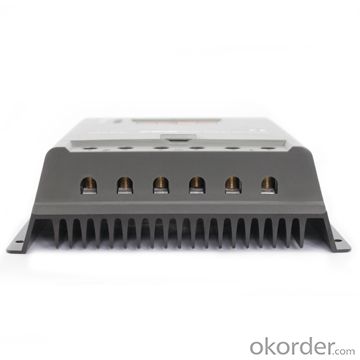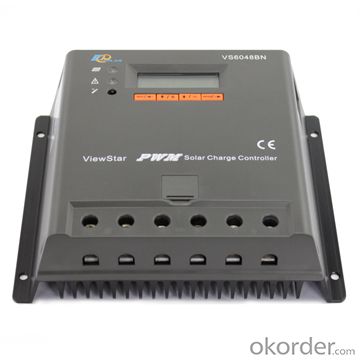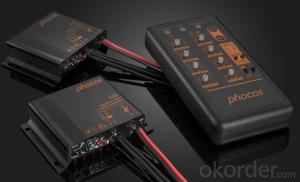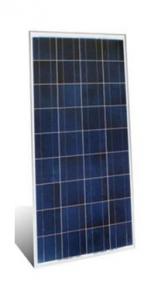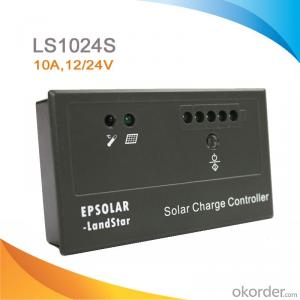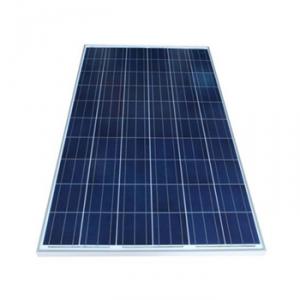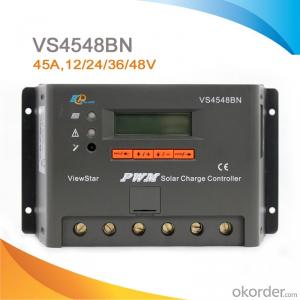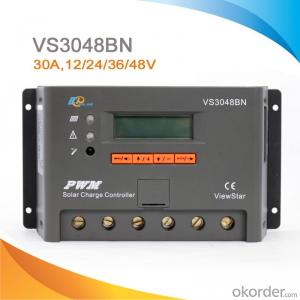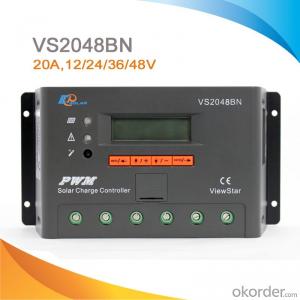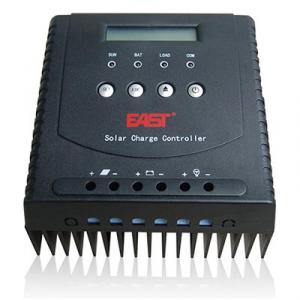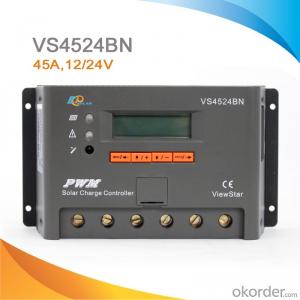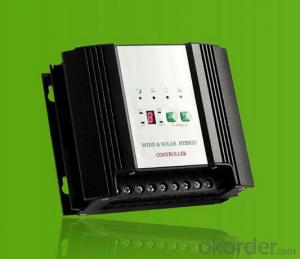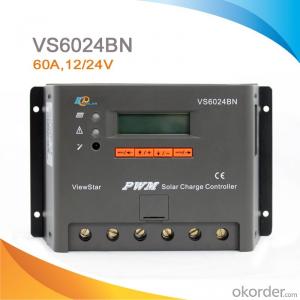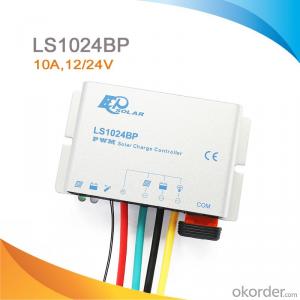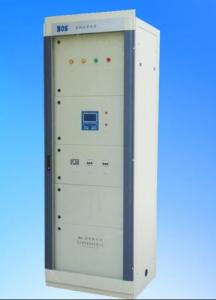Solar Controllers 10a LCD Display PWM Solar Charge Controller /Regulator 60A 12/24/36/48V, VS6048BN
- Loading Port:
- Tianjin
- Payment Terms:
- TT or LC
- Min Order Qty:
- -
- Supply Capability:
- 10000 pc/month
OKorder Service Pledge
OKorder Financial Service
You Might Also Like
Features:
·Excellent EMC design
·32 bit MCU with high speed
·High efficient Series PWM charging
·Four battery type options: Sealed, Gel, Flooded, and USER
·Intelligent lighting and timer control for solar lighting system
·12 bit A/D high-precision sampling to ensure accuracy
·Use MOSFET as electronic switch
·Full control parameters setting and modification, diversified load control mode
·Humanized design of browser interface, undertake every operating conveniently
·Temperature compensation
·Adopt graphics dot-matrix LCD screen and HMI (human-machine interface) with 4 buttons,integrated menu displaying and operation
·Energy statistics function
·RS485 ports with MODBUS communication protocol
·Optional PC monitoring software and remote meter for real-time monitoring and battery management parameter setting
·Field upgradable firmware
Electronic Protections:
·PV short circuit protection
·PV reverse polarity protection
·Battery overcharge protection
·Battery over discharge protection
·Battery reverse polarity protection
·Load overload protection
·Load short circuit protection
·Overheating protection
Specification:
Nominal system voltage | 12/24/36/48V auto work | |||
Rated battery current | 20A | 30A | 45A | 60A |
Rated load current | 20A | 30A | 45A | 60A |
Max. battery voltage | 64V | |||
Equalize charging voltage | Sealed: 14.6V, Flooded: 14.8V, User-defined: 9~17V | |||
Boost charging voltage | Gel: 14.2V, Sealed: 14.6V, Flooded: 14.8V, User-defined: 9~17V | |||
Float charging voltage | Gel /Sealed /Flooded: 13.8V, User-defined: 9~17V | |||
Low voltage reconnect voltage | Gel /Sealed /Flooded: 12.6V, User-defined: 9~17V | |||
Low voltage disconnect voltage | Gel /Sealed /Flooded: 11.1V, User-defined: 9~17V | |||
Self-consumption | ≤15mA(12V); ≤10mA(24V); ≤9mA(36V); ≤8mA(48V) | |||
Grounding | Common negative | |||
Temp. compensation | -3mV/°C/2V | |||
Relative humidity | 10%~90% Non-condensation | |||
Communication | RS485 / RJ45 interface | |||
LCD temperature | -20°C ~ +70°C | |||
Working temperature | -25°C ~ +55°C | |||
Humidity | ≤95% N.C. | |||
Enclosure | IP30 | |||
Overall dimension | 200x103x58mm | 201x109x59mm | 205x119x67mm | 205x174x64mm |
Terminals | 16mm2 | 35mm2 | 35mm2 | 35mm2 |
Net weight | 0.7kg | 0.9kg | 1.2kg | 1.5kg |
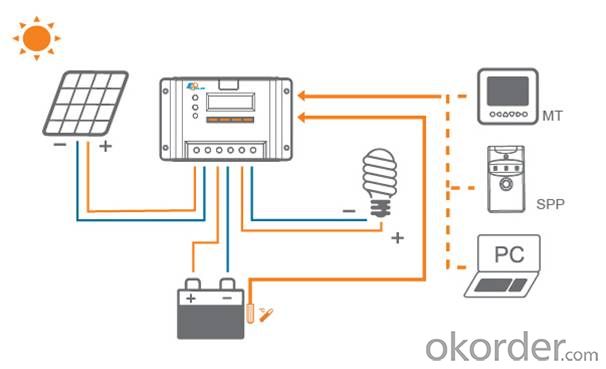
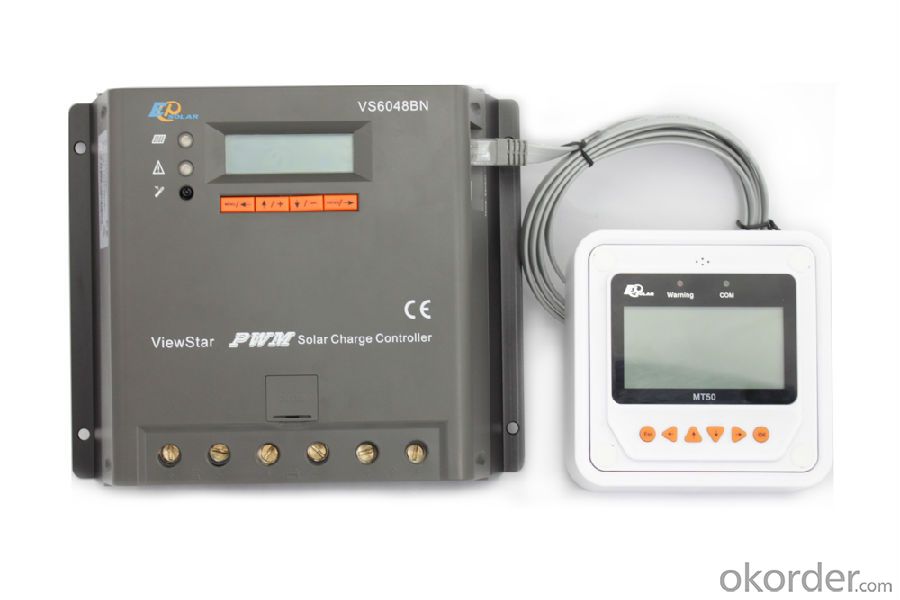
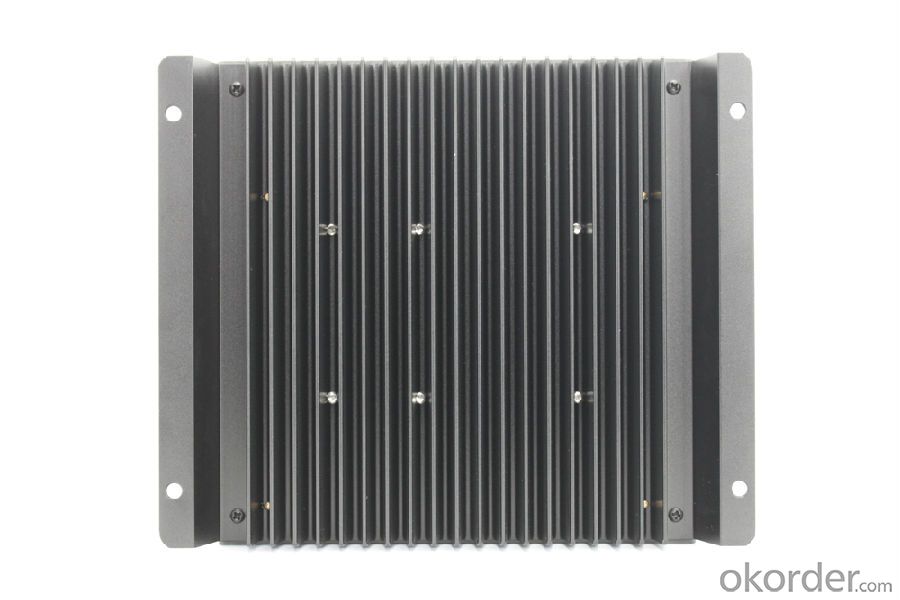
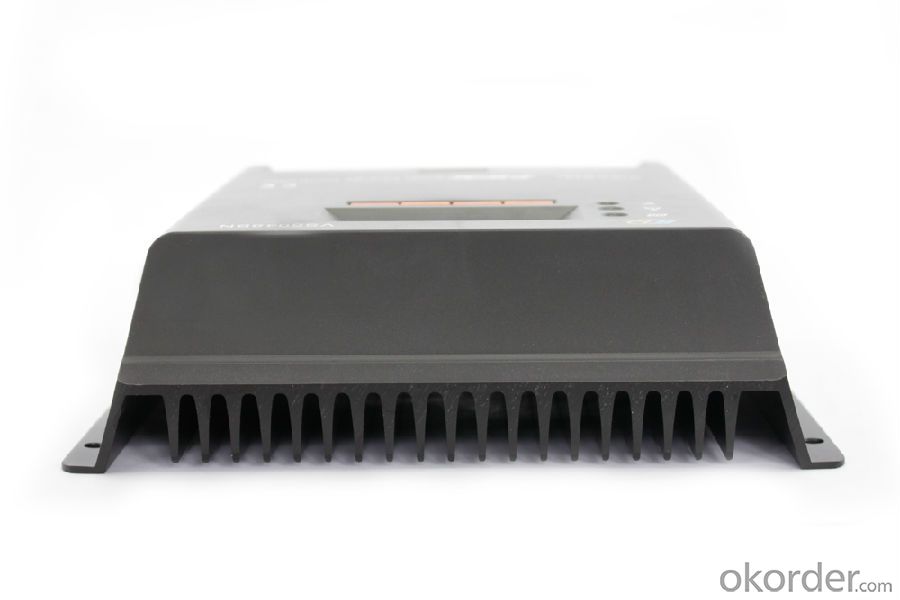
FAQ:
Q1. What is the voltage?
A1. Our 45/60A solar charge controller is 12/24/36/48V auto work.
Q2. What is the difference between MPPT&PWM?
A2. MPPT has higher efficiency, it can track the max power point and won't waste energy.
Q3. What is the efficiency of the MPPT controller?
A3. MPPT>99%, peak conversion efficiency>98%.
Q4. What is the waranty of product?
A4. 12 months.
- Q: How does a solar controller prevent reverse current flow?
- A solar controller prevents reverse current flow by utilizing diodes that act as one-way valves, allowing current to flow from the solar panel to the battery but not in the opposite direction.
- Q: Are there any disadvantages of using a solar controller?
- Yes, there are some disadvantages of using a solar controller. One major disadvantage is that solar controllers can be quite expensive to purchase and install. The cost of a solar controller can add to the overall cost of setting up a solar power system, which may be a deterrent for some individuals or businesses. Another disadvantage is that solar controllers can be quite complex to operate and maintain. They require proper programming and configuration to ensure optimal performance, and regular maintenance to keep them functioning efficiently. This may require technical expertise or the hiring of professionals, which can be an additional cost. In addition, solar controllers can have limited compatibility with certain solar panels or battery systems. It is important to ensure that the solar controller is compatible with the specific components of the solar power system, otherwise it may not function properly or could even cause damage. Lastly, solar controllers rely on sunlight to generate power, so they may not be as effective in areas with limited sunlight or during cloudy days. This can result in reduced energy production and may require alternative power sources or energy storage solutions. Overall, while solar controllers offer many benefits in terms of regulating and optimizing solar power systems, they do come with some disadvantages that need to be considered before making a decision.
- Q: How does a solar controller handle the display of system information?
- A solar controller handles the display of system information by collecting and processing data from various sensors and components of the solar system. It then uses this information to provide real-time updates on the system's performance, including battery status, charging/discharging rates, voltage, and current levels. This data is typically displayed on a digital screen or LED indicator, allowing users to monitor and optimize the efficiency of their solar system.
- Q: How does a solar controller handle the protection against reverse polarity?
- A solar controller handles the protection against reverse polarity by employing diodes or other electronic components that prevent the flow of current in the wrong direction. This ensures that the solar panel is connected correctly to the battery, preventing any potential damage or malfunction caused by reverse polarity.
- Q: Can a solar controller be used with a portable solar panel?
- Yes, a solar controller can be used with a portable solar panel. A solar controller is designed to regulate the charging process of a solar panel and prevent overcharging of the battery. It acts as a middleman between the solar panel and the battery, ensuring that the battery receives the optimal level of charge. Whether it is a portable solar panel or a fixed one, a solar controller can be used to maximize the efficiency and lifespan of the battery.
- Q: What are the types of solar controllers?
- There are primarily three types of solar controllers: PWM (Pulse Width Modulation) controllers, MPPT (Maximum Power Point Tracking) controllers, and basic on-off controllers. PWM controllers are the most common type and are suitable for small to medium-sized solar systems. They regulate the voltage output from the solar panels by rapidly switching the power on and off, maintaining a constant voltage for the battery. PWM controllers are affordable, easy to use, and provide good efficiency for most applications. MPPT controllers are more advanced and efficient than PWM controllers. They track the maximum power point of the solar panels by adjusting the voltage and current to match the battery requirements. This enables MPPT controllers to extract the maximum amount of power from the solar panels, especially in low-light or partially shaded conditions. MPPT controllers are ideal for larger solar systems and can significantly increase the overall efficiency and power output. Basic on-off controllers are the simplest type and are usually used in very small solar systems where cost and complexity are major concerns. They directly connect the solar panels to the battery, and when the battery reaches its full charge, the controller disconnects the panels to prevent overcharging. While these controllers are inexpensive, they offer limited functionality and are not as efficient as PWM or MPPT controllers. The choice of solar controller depends on the size of the solar system, available budget, and desired efficiency. It is important to select the appropriate controller to ensure the optimal performance and longevity of the solar system.
- Q: What is the maximum load voltage a solar controller can handle?
- The maximum load voltage a solar controller can handle depends on the specific model and its specifications. It is recommended to consult the manufacturer's guidelines or the product manual to determine the maximum load voltage capacity of a particular solar controller.
- Q: Can a solar controller be used with solar panels that are connected to a battery management system?
- Yes, a solar controller can be used with solar panels that are connected to a battery management system. A solar controller, also known as a charge controller, is designed to regulate the charging process of a battery connected to solar panels. It ensures that the battery is charged efficiently and protects it from overcharging or excessive discharge. A battery management system, on the other hand, is responsible for monitoring and controlling the battery's performance, including factors like temperature, voltage, and current. While the battery management system focuses on the battery, the solar controller manages the charging process from the solar panels to the battery. Therefore, both systems can work together in harmony and provide an optimized and safe charging solution for solar panels connected to a battery.
- Q: Can a solar controller be used in a solar-powered electric fence system?
- Yes, a solar controller can be used in a solar-powered electric fence system. The solar controller helps regulate the charging and discharging of the solar battery, ensuring optimal performance and extending battery life. It also protects the battery from overcharging and over-discharging, making it an essential component in a solar-powered electric fence setup.
- Q: Can a solar controller be used in a solar-powered space elevator system?
- No, a solar controller cannot be used in a solar-powered space elevator system. A space elevator system requires advanced technology and specialized components that are specifically designed for the unique challenges and requirements of such a system. A solar controller, which is typically used to regulate the power output of solar panels in small-scale applications, would not be suitable for the complex and high-power demands of a space elevator.
Send your message to us
Solar Controllers 10a LCD Display PWM Solar Charge Controller /Regulator 60A 12/24/36/48V, VS6048BN
- Loading Port:
- Tianjin
- Payment Terms:
- TT or LC
- Min Order Qty:
- -
- Supply Capability:
- 10000 pc/month
OKorder Service Pledge
OKorder Financial Service
Similar products
Hot products
Hot Searches
Related keywords
